
Once upon a time, back in 2005, there lived on the internet a website called YouTube. It's a name that, today, many people recognize as a video-sharing website -- and much more -- that's owned by Google. But over a decade ago, YouTube wasn't what it is today. In 2005, YouTube was a dating site.
Yes, you read that correctly. YouTube began as a dating site.
It's something that the co-founders have discussed in interviews, but the rest of us rarely do. Since the late 90s, how many websites have transformed into something completely different from what they originally set out to be? 
As it turns out, many of our most beloved destination sites -- some of which we frequently write about and are essential to marketers -- were borderline unrecognizable when they first launched. What were they then? And what can marketers stand to learn from it?
Spoiler alert: It's been a long time since people recorded things in stone. It's the internet, and it allows for progressive changes to design, product, and the way they're marketed. But remember -- be strategic. If you're looking to make some big changes, check out our quick guide to branding.
7 Websites That Used to Be Something Completely Different
1) Amazon
- Founded: 1994
- Original model: "Earth's biggest bookstore."
Before:
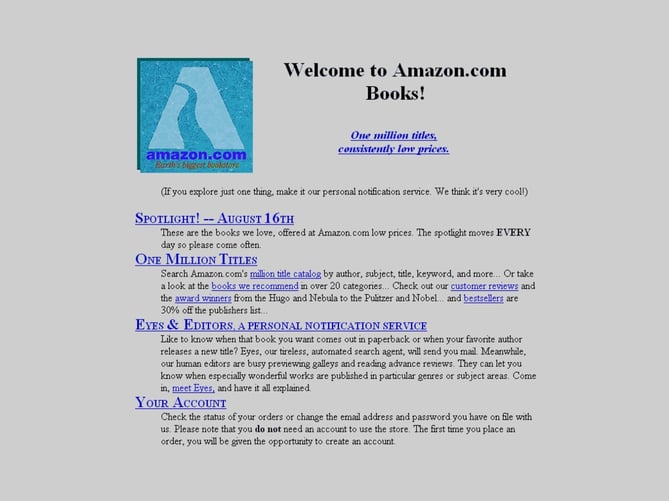 Source: Newfangled
Source: Newfangled
Founder Jeff Bezos is said to have chosen books from his list of 20 products he thought would sell online, because they were the lowest-cost and most universally-demanded. And sure, Amazon still sells books -- and a lot more. The amount of growth it has witnessed in the two decades since its incorporation is beyond impressive.
Today:
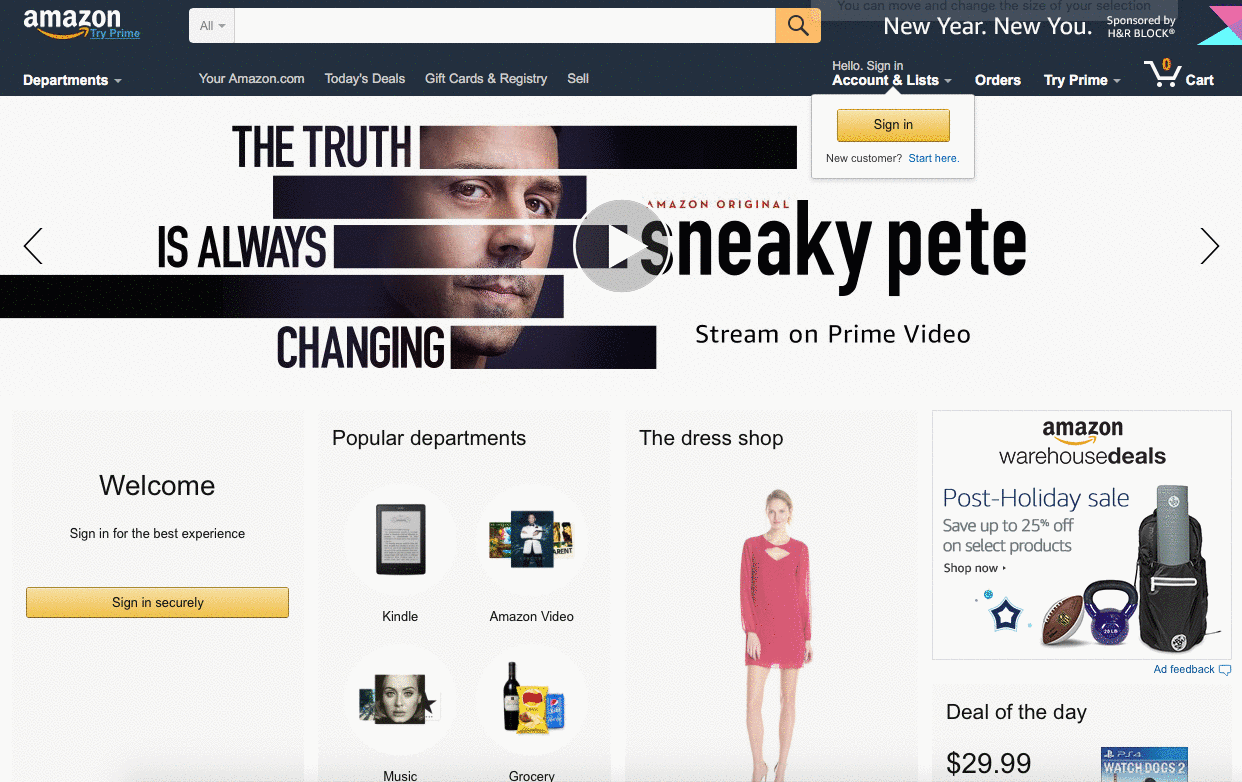
- Current model:
- "Amazon is guided by four principles: customer obsession rather than competitor focus, passion for invention, commitment to operational excellence, and long-term thinking."
- It sells much more than just books -- it's now a full ecommerce operation.
- In addition to online shopping, Amazon now produces and offers, among many other things:
- The Amazon Echo, a digital personal assistant and smart home device.
- The Kindle E-reader.
- Original entertainment programing.
- Streaming media tools and devices.
- Music downloads.
- Grocery delivery.
- Total assets: $67.7 billion
- Employees: 230,800
2) Netflix
- Founded: 1997
- Original model: "To offer online movie rentals."
Before:
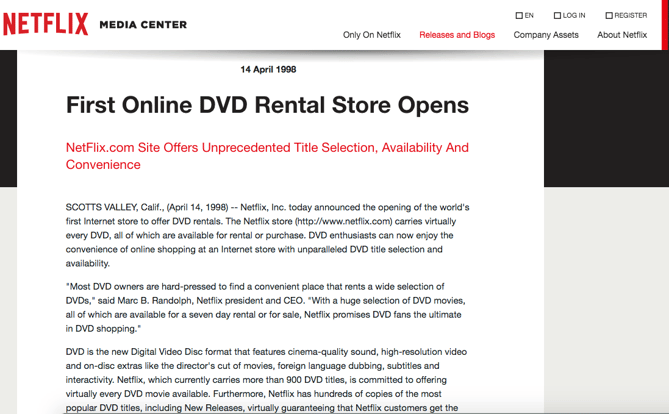 Source: Netflix
Source: Netflix
When Reed Hastings and Marc Randolph co-founded Netflix, the intention was clear -- they wanted to create an easy way for people to rent and return movies, without having to drive to the now-extinct video store. Now, things look a little different.
Today:
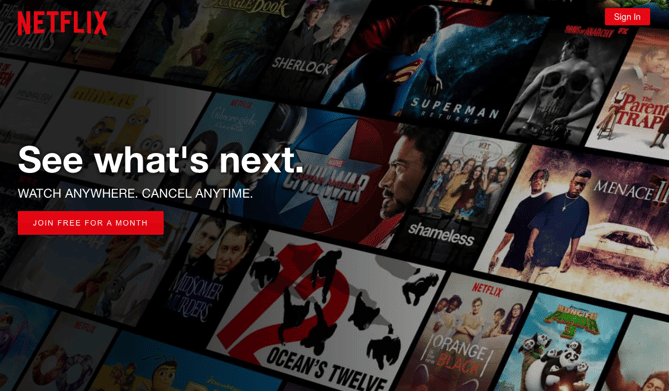
- Current model:
- "The world’s leading Internet television network."
- Offers original and syndicated programming via streaming technology.
- Content is personalized, with algorithms designed to make recommendations based on viewing behavior and history.
- DVD rentals are still available, but only through DVD.com, owned by Netflix.
- Total assets: $11.26 billion
- Employees: 3,700
3) Facebook
- Founded: 2004 (as Thefacebook)
- Original model: "An online directory that connects people through social networks at colleges."
Before:
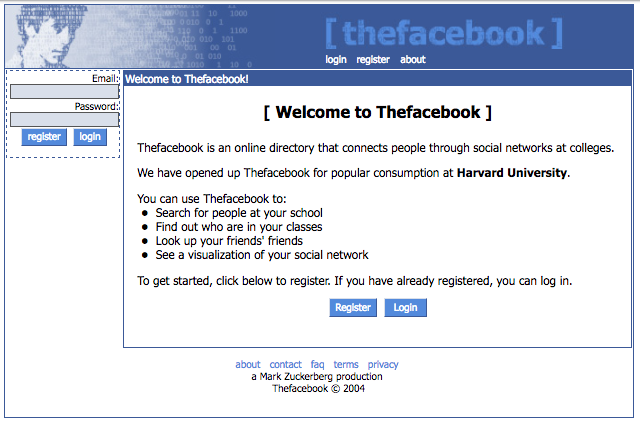 Source: Wayback Machine
Source: Wayback Machine
There have been many pop cultural references to Facebook since its 2004 launch. But on the surface, founder Mark Zuckerberg's intentions were fairly clear -- to allow students at Harvard to connect online. Eventually, the network expanded to most U.S. colleges and universities, until it was announced in 2006 that anyone would be able to join.
Today:
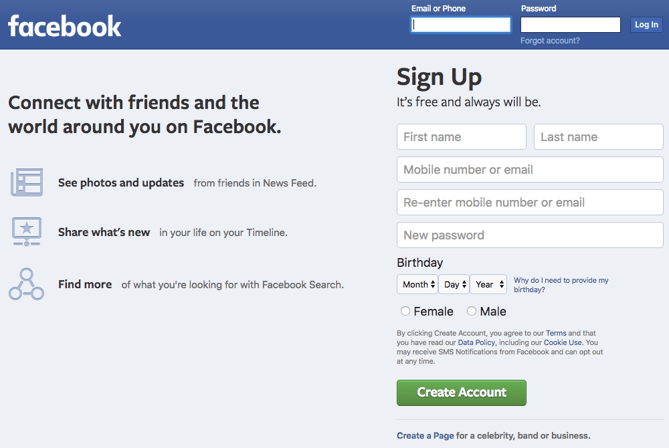
- Current model:
- "To give people the power to share and make the world more open and connected."
- Anyone can create a profile, with some parameters for members who are minors.
- Is the primary source of news for 44% of the general population.
- Averages 1.18 billion daily active users.
- Total assets: $49.41 billion
- Employees: 12,691
4) YouTube
- Founded: 2005
- Original model: "The first online community site that allows members to post and share personal videos."
Before:
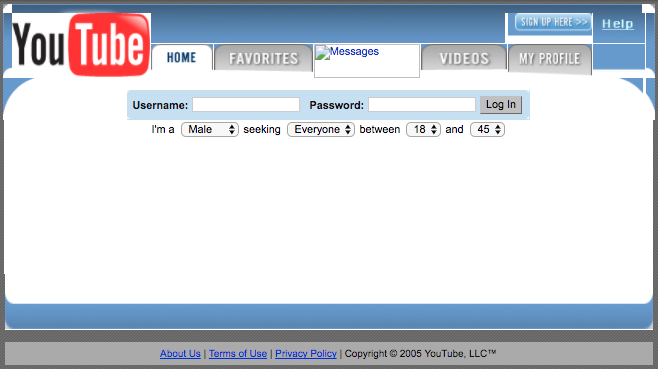 Source: Wayback Machine
Source: Wayback Machine
It's true -- as we mentioned earlier, YouTube had very brief beginnings as a dating website. Its founders have spoken to the press about it on more than one occasion. CEO Chad Hurley once told Time that the intention was for YouTube to serve as "a video version of HOTorNOT.com," a site in which users would rate the attractiveness of complete strangers on a scale of one to 10. To the delight of its many current users, that's no longer the case.
Today:
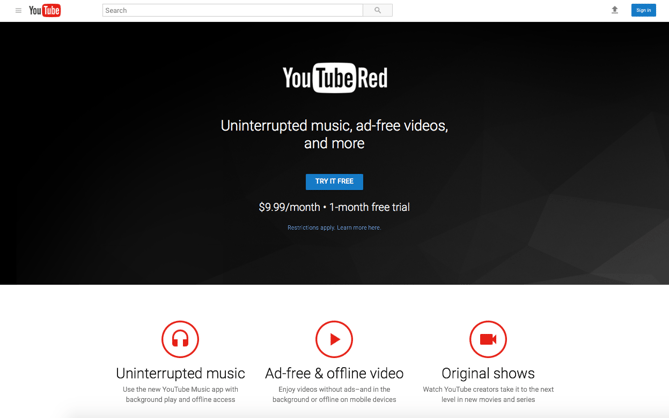
- Current model:
- "Allows billions of people to discover, watch and share originally-created videos."
- Offers YouTube Red, a paid membership that offers ad-free videos and music.
- Acquired by Google in 2006 and has since operated as "a Google company."
5) Inbound.org
- Founded: 2012
- Original model: "To enable great content from the world of inbound marketing to get noticed."
Before:
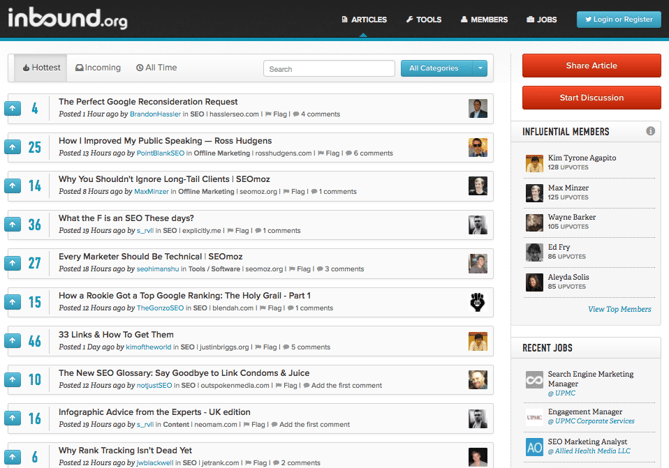 Source: Wayback Machine
Source: Wayback Machine
As the story goes, a pair of friends -- Moz co-founder Rand Fishkind and HubSpot co-founder Dharmesh Shah -- started Inbound.org "for fun," and to provide a platform for the content creators who were following the somewhat-new principles of inbound marketing. There were member-powered discussion boards, Q&As, and job listings. And while the foundation of that community is still, at its core, very much the same, the site provides even more to do and see.
Today:
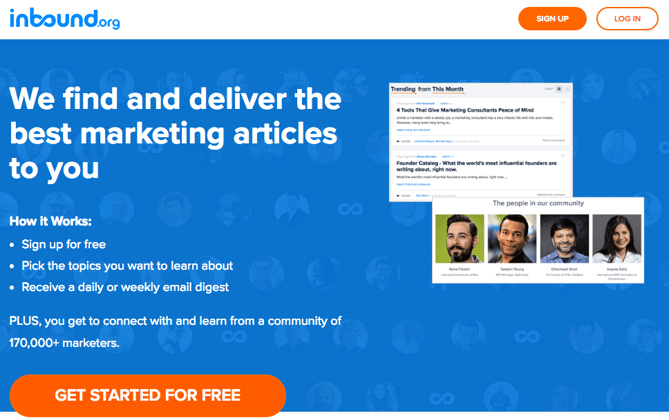
- Current model:
- "An online hub where good Marketers come to get better."
- Members can do more than ask questions and start conversations -- they can post original content on Inbound.org. That comes with the opportunity for other members to "upvote" it.
- Offers discussion boards, original content, and ways for members to earn badges, among other marketing-related resources. As Casey Henry -- who oversees growth for Inbound.org -- says, it's "a community where marketers access, share, and leverage marketing resources all in one place."
- Members: 204,929
6) BuzzFeed
- Founded: 2006
- Original model: "Distinguishes what is actually interesting from what is merely hyped."
Before:
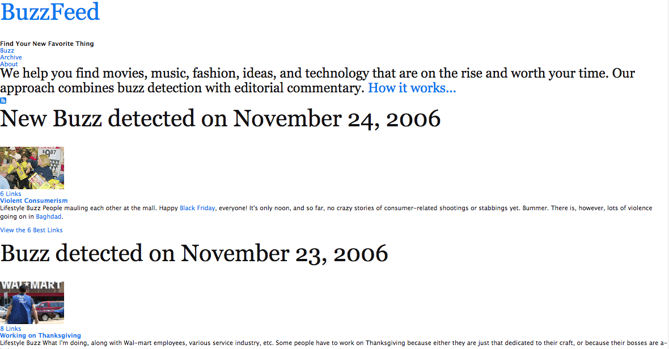 Source: Wayback Machine
Source: Wayback Machine
It seems like BuzzFeed has really earned a name for itself in the realm of listicles, like "6 Items That Totally Overreact To Being Microwaved," and other light -- but fun -- content, like quizzes to determine how many marriages you'll have, based on your favorite cheese. (Even we can't make this stuff up.) But it wasn't always like that. BuzzFeed was actually founded on the principle to detect only the most important news items that were "on the rise and worth your time."
Today:
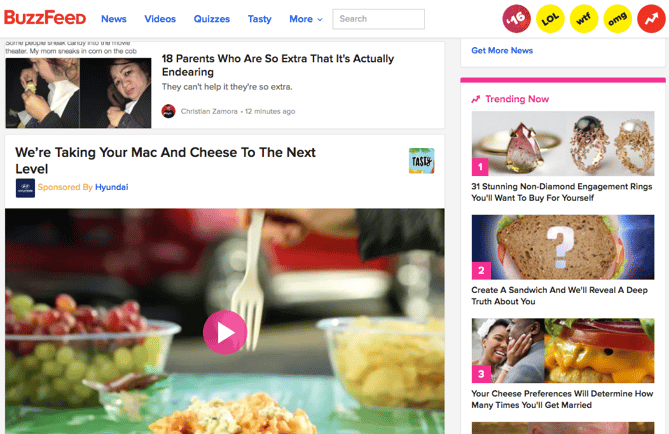
- Current model:
- "The leading independent digital media company delivering news and entertainment to hundreds of millions of people around the world."
- Appears to be striving for a balance of listicles, quizzes, and serious news, with top stories ranging from topics like health care, to "43 Thoughts Everyone Has While Shopping At Target."
- Offers original, branded content in numerous formats, including video.
- Has established a portfolio of owned and affiliated shows, including Tasty, which is best known for abbreviated cooking demonstrations.
- Total assets: $55.93 million (according to documents obtained by Gawker in 2015)
- Employees: 1,300
7) Airbnb
- Founded: 2008
- Original model: "An online marketplace for peer-to-peer traveling."
Before:
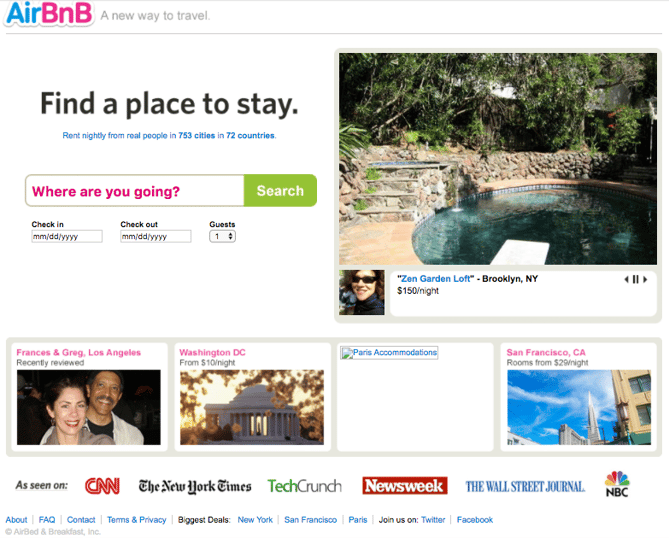 Source: Wayback Machine
Source: Wayback Machine
When Airbnb -- first known as AirBed & Breakfast -- started out, the mission was to help people make money. Much of the focus was on homeowners, and the efforts to help them earn supplemental income by renting extra space, empty apartments, and even fold-out couches to kind people. And yes, renters also benefitted by finding affordable places to stay when traveling. But since its inception, Airbnb has gotten a major makeover -- one that's safer, more expensive, and offers more than just lodging.
Today:
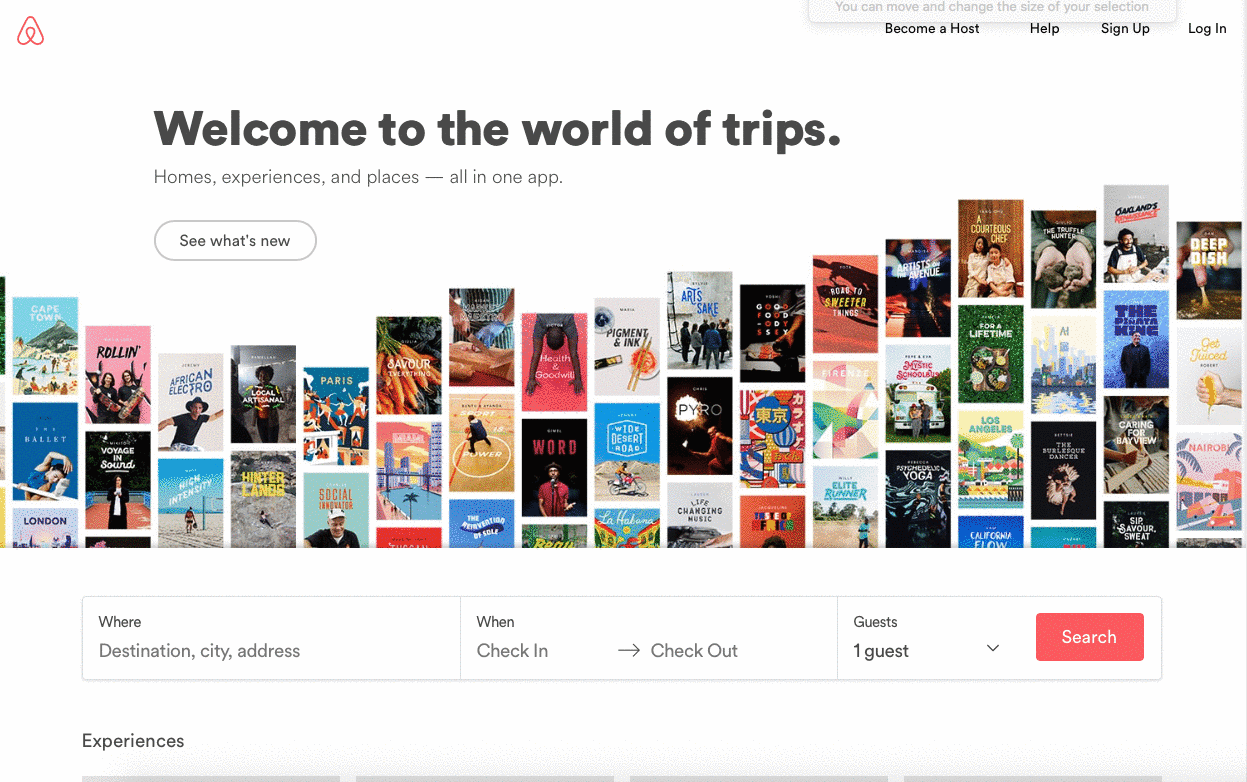
- Current model:
- "A trusted community marketplace for people to list, discover, and book unique accommodations around the world — online."
- Has implemented a series of precautions to improve safety for both homeowners and travelers.
- Affordability is no longer emphasized to travelers -- listings are available for as much as $4,000 a night.
- In addition to lodging, Airbnb now offers curated experiences for travelers who want a trip to center around certain interests, including:
- Sports
- Nature
- Social Impact
- Entertainment
- Food
- Arts
- Valuation: $30 billion
- Employees: 1,917
What's Your Before-And-After?
Things change. Businesses, brands, entrepreneurs, and websites do, too. Maybe your original idea isn't going in the direction you had hoped. Or maybe, you know you can make it bigger.
These examples show that it's more than acceptable -- and often beneficial -- to ask questions like, "What's next?" or, "What needs to change?" Of course, positive evolution takes time, and these brands had an average period of 12 years between their "Before" and "Today." So be patient, but be creative. With that combination, there's no limit to where your brand and its online presence can go.
What are your favorite before-and-after websites? Let us know in the comments.
from HubSpot Marketing Blog https://blog.hubspot.com/marketing/before-and-after-websites
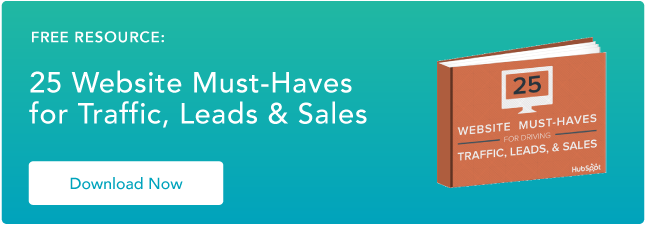

No comments:
Post a Comment